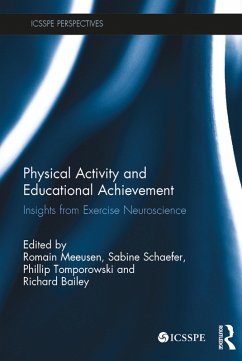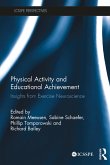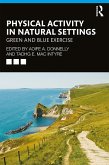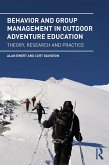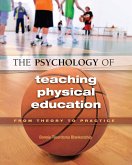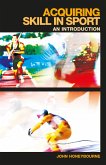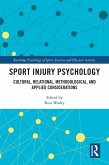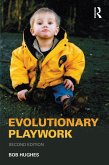Physical Activity and Educational Achievement (eBook, ePUB)
Insights from Exercise Neuroscience
Redaktion: Meeusen, Romain; Bailey, Richard; Tomporowski, Phillip; Schaefer, Sabine
45,95 €
45,95 €
inkl. MwSt.
Sofort per Download lieferbar

23 °P sammeln
45,95 €
Als Download kaufen

45,95 €
inkl. MwSt.
Sofort per Download lieferbar

23 °P sammeln
Jetzt verschenken
Alle Infos zum eBook verschenken
45,95 €
inkl. MwSt.
Sofort per Download lieferbar
Alle Infos zum eBook verschenken

23 °P sammeln
Physical Activity and Educational Achievement (eBook, ePUB)
Insights from Exercise Neuroscience
Redaktion: Meeusen, Romain; Bailey, Richard; Tomporowski, Phillip; Schaefer, Sabine
- Format: ePub
- Merkliste
- Auf die Merkliste
- Bewerten Bewerten
- Teilen
- Produkt teilen
- Produkterinnerung
- Produkterinnerung

Bitte loggen Sie sich zunächst in Ihr Kundenkonto ein oder registrieren Sie sich bei
bücher.de, um das eBook-Abo tolino select nutzen zu können.
Hier können Sie sich einloggen
Hier können Sie sich einloggen
Sie sind bereits eingeloggt. Klicken Sie auf 2. tolino select Abo, um fortzufahren.

Bitte loggen Sie sich zunächst in Ihr Kundenkonto ein oder registrieren Sie sich bei bücher.de, um das eBook-Abo tolino select nutzen zu können.
This book examines a range of processes associated with physical activity that are of relevance to those working in education, including learning, memory, attention, mood, and mental health symptoms, and draws on the latest research in exercise neuroscience. Cutting through the myths, it also looks asks what the limits of this research might be.
- Geräte: eReader
- mit Kopierschutz
- eBook Hilfe
- Größe: 3292.23MB
Andere Kunden interessierten sich auch für
![Physical Activity and Educational Achievement (eBook, PDF) Physical Activity and Educational Achievement (eBook, PDF)]() Physical Activity and Educational Achievement (eBook, PDF)45,95 €
Physical Activity and Educational Achievement (eBook, PDF)45,95 €![Physical Activity in Natural Settings (eBook, ePUB) Physical Activity in Natural Settings (eBook, ePUB)]() Physical Activity in Natural Settings (eBook, ePUB)38,95 €
Physical Activity in Natural Settings (eBook, ePUB)38,95 €![Behavior and Group Management in Outdoor Adventure Education (eBook, ePUB) Behavior and Group Management in Outdoor Adventure Education (eBook, ePUB)]() Alan EwertBehavior and Group Management in Outdoor Adventure Education (eBook, ePUB)45,95 €
Alan EwertBehavior and Group Management in Outdoor Adventure Education (eBook, ePUB)45,95 €![The Psychology of Teaching Physical Education (eBook, ePUB) The Psychology of Teaching Physical Education (eBook, ePUB)]() Bonnie BlankenshipThe Psychology of Teaching Physical Education (eBook, ePUB)56,95 €
Bonnie BlankenshipThe Psychology of Teaching Physical Education (eBook, ePUB)56,95 €![Acquiring Skill in Sport: An Introduction (eBook, ePUB) Acquiring Skill in Sport: An Introduction (eBook, ePUB)]() John HoneybourneAcquiring Skill in Sport: An Introduction (eBook, ePUB)49,95 €
John HoneybourneAcquiring Skill in Sport: An Introduction (eBook, ePUB)49,95 €![Sport Injury Psychology (eBook, ePUB) Sport Injury Psychology (eBook, ePUB)]() Sport Injury Psychology (eBook, ePUB)41,95 €
Sport Injury Psychology (eBook, ePUB)41,95 €![Evolutionary Playwork (eBook, ePUB) Evolutionary Playwork (eBook, ePUB)]() Bob HughesEvolutionary Playwork (eBook, ePUB)45,95 €
Bob HughesEvolutionary Playwork (eBook, ePUB)45,95 €-
-
-
This book examines a range of processes associated with physical activity that are of relevance to those working in education, including learning, memory, attention, mood, and mental health symptoms, and draws on the latest research in exercise neuroscience. Cutting through the myths, it also looks asks what the limits of this research might be.
Dieser Download kann aus rechtlichen Gründen nur mit Rechnungsadresse in A, B, BG, CY, CZ, D, DK, EW, E, FIN, F, GR, HR, H, IRL, I, LT, L, LR, M, NL, PL, P, R, S, SLO, SK ausgeliefert werden.
Produktdetails
- Produktdetails
- Verlag: Taylor & Francis eBooks
- Seitenzahl: 400
- Erscheinungstermin: 7. August 2017
- Englisch
- ISBN-13: 9781315305776
- Artikelnr.: 49041122
- Verlag: Taylor & Francis eBooks
- Seitenzahl: 400
- Erscheinungstermin: 7. August 2017
- Englisch
- ISBN-13: 9781315305776
- Artikelnr.: 49041122
- Herstellerkennzeichnung Die Herstellerinformationen sind derzeit nicht verfügbar.
Romain Meeusen is Head of the Department of Human Physiology at the Vrije Universiteit Brussel, Belgium. Sabine Schaefer is Head of the Department of Motion Science, Motor Science and Cognition, Saarland University, Germany. Phillip Tomporowski is a Professor of Kinesiology at the University of Georgia, USA. Richard Bailey is Senior Researcher at the International Council of Sport Science and Physical Education (ICSSPE) based in Berlin, Germany.
Introduction [Romain Meeusen, Sabine Schaefer, Phillip Tomporowski and
Richard Bailey] Part I: Progress and possibilities 1. Physical activity and
educational achievement: dose-response relationships [Erin K. Howie and
Russell R. Pate] 2. Varieties of learning and developmental theories of
memory: neurophysiological evidence and its relevance for researchers and
educators [Phillip Tomporowski, Daniel M. Pendleton and Bryan A. McCullick]
3. Future directions: rigorous research design and authentic application of
neuroscience [Charles H. Hillman and Darla M. Castelli] Part II: Insights
and innovations 4. Exercise, neurotransmission and neurotrophic factors
[Romain Meeusen, Cajsa Tonoli, Kristel Knaepen and Danusa Dias Soares] 5.
The development of the acute exercise-catecholamines-cognition interaction
theory: implications for learning and memory [Terry McMorris] 6. The
motor-cognitive connection: indicator of future developmental success in
children and adolescents? [Nadja Schott and Thomas Klotzbier] 7.
Psychological responses to stress and exercise on students' lives [Eduardo
Matta Mello Portugal] 8. Structural and functional brain changes related to
acute and chronic exercise effects in children, adolescents and young
adults [Claudia Voelcker-Rehage, Claudia Niemann and Lena Hübner] 9. The
impact of physical activities on age-related brain function and structure
and the underlying neural mechanisms [Patrick Müller, Anita Hökelmann and
Notger G. Müller] 10. A review of laboratory studies on the acute effects
of movement and exercise on cognition in children [Nadja Walter and Sabine
Schaefer] 11. Exercise as neuro-enhancer in children with ADHD: cognitive
and behavioural effects [Sebastian Ludyga, Serge Brand, Markus Gerber and
Uwe Pühse] 12. The effect of different exercise programmes on cognitive
functioning in children and adolescents [Henning Budde, Flora Koutsandréou
and Mirko Wegner] 13. The integrative neuroscience of physical activity,
fitness and academic proficiency [R. Davis Moore, Jacob J. Kay and Eric S.
Drollette] 14. Coupling our plough of thoughtful moving to the star of
children's right to play: from neuroscience to multisectoral promotion
[Caterina Pesce, Avery D. Faigenbaum, Marios Goudas and Phillip
Tomporowski] Part III: Education and evaluation 15. A review of
school-based studies on the effect of acute physical activity on cognitive
function in children and young people [Andy Daly-Smith, Jim Mckenna, Greta
Defeyter and Andrew Manley] 16. The effect of teaching methodologies in
promoting physical and cognitive development in children [Patrizia Tortella
and Guido Fumagalli] 17. Different solutions from Finnish and Danish school
systems for increasing school-day physical activity and supporting
learning: a top-down or bottom-up approach? [Tuija Tammelin, Heidi Syväoja,
Anna Bugge and Karsten Froberg] 18. Science, pseudoscience and exercise
neuroscience: untangling the good, the bad and the ugly [Richard Bailey]
Index
Richard Bailey] Part I: Progress and possibilities 1. Physical activity and
educational achievement: dose-response relationships [Erin K. Howie and
Russell R. Pate] 2. Varieties of learning and developmental theories of
memory: neurophysiological evidence and its relevance for researchers and
educators [Phillip Tomporowski, Daniel M. Pendleton and Bryan A. McCullick]
3. Future directions: rigorous research design and authentic application of
neuroscience [Charles H. Hillman and Darla M. Castelli] Part II: Insights
and innovations 4. Exercise, neurotransmission and neurotrophic factors
[Romain Meeusen, Cajsa Tonoli, Kristel Knaepen and Danusa Dias Soares] 5.
The development of the acute exercise-catecholamines-cognition interaction
theory: implications for learning and memory [Terry McMorris] 6. The
motor-cognitive connection: indicator of future developmental success in
children and adolescents? [Nadja Schott and Thomas Klotzbier] 7.
Psychological responses to stress and exercise on students' lives [Eduardo
Matta Mello Portugal] 8. Structural and functional brain changes related to
acute and chronic exercise effects in children, adolescents and young
adults [Claudia Voelcker-Rehage, Claudia Niemann and Lena Hübner] 9. The
impact of physical activities on age-related brain function and structure
and the underlying neural mechanisms [Patrick Müller, Anita Hökelmann and
Notger G. Müller] 10. A review of laboratory studies on the acute effects
of movement and exercise on cognition in children [Nadja Walter and Sabine
Schaefer] 11. Exercise as neuro-enhancer in children with ADHD: cognitive
and behavioural effects [Sebastian Ludyga, Serge Brand, Markus Gerber and
Uwe Pühse] 12. The effect of different exercise programmes on cognitive
functioning in children and adolescents [Henning Budde, Flora Koutsandréou
and Mirko Wegner] 13. The integrative neuroscience of physical activity,
fitness and academic proficiency [R. Davis Moore, Jacob J. Kay and Eric S.
Drollette] 14. Coupling our plough of thoughtful moving to the star of
children's right to play: from neuroscience to multisectoral promotion
[Caterina Pesce, Avery D. Faigenbaum, Marios Goudas and Phillip
Tomporowski] Part III: Education and evaluation 15. A review of
school-based studies on the effect of acute physical activity on cognitive
function in children and young people [Andy Daly-Smith, Jim Mckenna, Greta
Defeyter and Andrew Manley] 16. The effect of teaching methodologies in
promoting physical and cognitive development in children [Patrizia Tortella
and Guido Fumagalli] 17. Different solutions from Finnish and Danish school
systems for increasing school-day physical activity and supporting
learning: a top-down or bottom-up approach? [Tuija Tammelin, Heidi Syväoja,
Anna Bugge and Karsten Froberg] 18. Science, pseudoscience and exercise
neuroscience: untangling the good, the bad and the ugly [Richard Bailey]
Index
Introduction [Romain Meeusen, Sabine Schaefer, Phillip Tomporowski and
Richard Bailey] Part I: Progress and possibilities 1. Physical activity and
educational achievement: dose-response relationships [Erin K. Howie and
Russell R. Pate] 2. Varieties of learning and developmental theories of
memory: neurophysiological evidence and its relevance for researchers and
educators [Phillip Tomporowski, Daniel M. Pendleton and Bryan A. McCullick]
3. Future directions: rigorous research design and authentic application of
neuroscience [Charles H. Hillman and Darla M. Castelli] Part II: Insights
and innovations 4. Exercise, neurotransmission and neurotrophic factors
[Romain Meeusen, Cajsa Tonoli, Kristel Knaepen and Danusa Dias Soares] 5.
The development of the acute exercise-catecholamines-cognition interaction
theory: implications for learning and memory [Terry McMorris] 6. The
motor-cognitive connection: indicator of future developmental success in
children and adolescents? [Nadja Schott and Thomas Klotzbier] 7.
Psychological responses to stress and exercise on students' lives [Eduardo
Matta Mello Portugal] 8. Structural and functional brain changes related to
acute and chronic exercise effects in children, adolescents and young
adults [Claudia Voelcker-Rehage, Claudia Niemann and Lena Hübner] 9. The
impact of physical activities on age-related brain function and structure
and the underlying neural mechanisms [Patrick Müller, Anita Hökelmann and
Notger G. Müller] 10. A review of laboratory studies on the acute effects
of movement and exercise on cognition in children [Nadja Walter and Sabine
Schaefer] 11. Exercise as neuro-enhancer in children with ADHD: cognitive
and behavioural effects [Sebastian Ludyga, Serge Brand, Markus Gerber and
Uwe Pühse] 12. The effect of different exercise programmes on cognitive
functioning in children and adolescents [Henning Budde, Flora Koutsandréou
and Mirko Wegner] 13. The integrative neuroscience of physical activity,
fitness and academic proficiency [R. Davis Moore, Jacob J. Kay and Eric S.
Drollette] 14. Coupling our plough of thoughtful moving to the star of
children's right to play: from neuroscience to multisectoral promotion
[Caterina Pesce, Avery D. Faigenbaum, Marios Goudas and Phillip
Tomporowski] Part III: Education and evaluation 15. A review of
school-based studies on the effect of acute physical activity on cognitive
function in children and young people [Andy Daly-Smith, Jim Mckenna, Greta
Defeyter and Andrew Manley] 16. The effect of teaching methodologies in
promoting physical and cognitive development in children [Patrizia Tortella
and Guido Fumagalli] 17. Different solutions from Finnish and Danish school
systems for increasing school-day physical activity and supporting
learning: a top-down or bottom-up approach? [Tuija Tammelin, Heidi Syväoja,
Anna Bugge and Karsten Froberg] 18. Science, pseudoscience and exercise
neuroscience: untangling the good, the bad and the ugly [Richard Bailey]
Index
Richard Bailey] Part I: Progress and possibilities 1. Physical activity and
educational achievement: dose-response relationships [Erin K. Howie and
Russell R. Pate] 2. Varieties of learning and developmental theories of
memory: neurophysiological evidence and its relevance for researchers and
educators [Phillip Tomporowski, Daniel M. Pendleton and Bryan A. McCullick]
3. Future directions: rigorous research design and authentic application of
neuroscience [Charles H. Hillman and Darla M. Castelli] Part II: Insights
and innovations 4. Exercise, neurotransmission and neurotrophic factors
[Romain Meeusen, Cajsa Tonoli, Kristel Knaepen and Danusa Dias Soares] 5.
The development of the acute exercise-catecholamines-cognition interaction
theory: implications for learning and memory [Terry McMorris] 6. The
motor-cognitive connection: indicator of future developmental success in
children and adolescents? [Nadja Schott and Thomas Klotzbier] 7.
Psychological responses to stress and exercise on students' lives [Eduardo
Matta Mello Portugal] 8. Structural and functional brain changes related to
acute and chronic exercise effects in children, adolescents and young
adults [Claudia Voelcker-Rehage, Claudia Niemann and Lena Hübner] 9. The
impact of physical activities on age-related brain function and structure
and the underlying neural mechanisms [Patrick Müller, Anita Hökelmann and
Notger G. Müller] 10. A review of laboratory studies on the acute effects
of movement and exercise on cognition in children [Nadja Walter and Sabine
Schaefer] 11. Exercise as neuro-enhancer in children with ADHD: cognitive
and behavioural effects [Sebastian Ludyga, Serge Brand, Markus Gerber and
Uwe Pühse] 12. The effect of different exercise programmes on cognitive
functioning in children and adolescents [Henning Budde, Flora Koutsandréou
and Mirko Wegner] 13. The integrative neuroscience of physical activity,
fitness and academic proficiency [R. Davis Moore, Jacob J. Kay and Eric S.
Drollette] 14. Coupling our plough of thoughtful moving to the star of
children's right to play: from neuroscience to multisectoral promotion
[Caterina Pesce, Avery D. Faigenbaum, Marios Goudas and Phillip
Tomporowski] Part III: Education and evaluation 15. A review of
school-based studies on the effect of acute physical activity on cognitive
function in children and young people [Andy Daly-Smith, Jim Mckenna, Greta
Defeyter and Andrew Manley] 16. The effect of teaching methodologies in
promoting physical and cognitive development in children [Patrizia Tortella
and Guido Fumagalli] 17. Different solutions from Finnish and Danish school
systems for increasing school-day physical activity and supporting
learning: a top-down or bottom-up approach? [Tuija Tammelin, Heidi Syväoja,
Anna Bugge and Karsten Froberg] 18. Science, pseudoscience and exercise
neuroscience: untangling the good, the bad and the ugly [Richard Bailey]
Index
